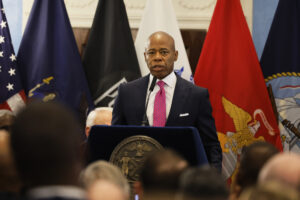(Photo
by
Alex
Wong/Getty
Images…
with
slight
edit)
Backing
the
Blue
is
more
than
just
a
rallying
cry
to
support
the
police
—
it
is
an
ethos
that
retroactively
makes
right
any
previous
wrongs.
Reports
say
that
people
don’t
respect
officers
as
much
as
they
used
to?
Back
the
Blue.
Studies
show
that
the
police
have
a
low
public
confidence
rating
because
of
their
cruel
treatment
of
women
and
minorities?
Back
the
Blue.
Waves
of
really
bad
PR
after
viral
video
shows
a
cop
pushing
down
an
old
man
who
cracks
his
head
on
the
pavement,
only
for
another
officer
to
prevent
the
first
cop
from
rendering
aid?
They’ll
investigate
themselves
and
find
no
wrongdoing.
BACK
THE
BLUE.
As
if
to
stop
the
Executive
from
having
all
of
the
fun,
the
U.S.
Judicial
Conference
Committee
on
Financial
Disclosure’s
recent
rule
revision
looks
like
a
prime
example
of
Backing
the
Black
(robes,
that
is).
Yes
—
Clarence
Thomas
is
the
figure
head
offender
—
but
this
revision
extends
to
every
robed
gavel
getting
gifts
from
billionaires.
Reuters
has
coverage:
U.S.
Supreme
Court
justices
and
federal
judges
on
lower
courts
do
not
have
to
publicly
disclose
when
they
dine
or
stay
at
someone’s
personal
residence,
even
one
owned
by
a
business
entity,
under
a
revised
ethics
rule.The
amended
policy
was
issued
on
Monday
by
the
U.S.
Judicial
Conference’s
Committee
on
Financial
Disclosure,
which
sets
rules
followed
by
the
nine
justices
and
other
federal
judges.
Critics
said
the
move
diluted
ethics
requirements.
If
you’re
thinking
that
this
change
retroactively
rights
a
bunch
of
Thomas’s
previous
gift
controversies,
you
aren’t
the
only
one.
Gabe
Roth
took
to
Fix
The
Court
to
break
down
some
of
the
prior
expenditures
SCOTUS
&
Co.
want
you
to
believe
don’t
warrant
a
second
look:
Here
are
some
places
with
corporate
ownership
where
Justice
Thomas
has
received
gifts
since
ascending
to
the
high
court:
- Mill
Creek
Farm
(multiple
years),
owned
by
CFH
Mill
Creek
Company,
L.P.,
located
in
East
Texas
(unsure
of
corporate
structure
but
Harlan
Crow
appears
to
control)- Camp
Topridge
(multiple
years),
owned
by
Topridge
Holdings,
LLC,
located
in
Upstate
New
York
(Crow)- The
Michaela
Rose
(multiple
years),
owned
by
Crow
Holdings,
LLC,
docked
who
knows
where
now
(Crow)Let’s
assume
each
counts
as
a
“personal
residence”
of
Crow
under
the
regs
since
Crow
spends
the
night
at
each
over
the
course
of
the
year,
and
assume
that
none
(save
the
Michaela
Rose
from
2003-15)
is
rented
out
to
the
public.When
Justice
Thomas
stays
for
free
at
these
places,
does
he
now
get
to
avail
himself
of
the
personal
hospitality
exemption?
Seems
like
it.
Years
ago,
Thomas
lamented
that
being
a
judge
on
the
highest
court
meant
that
he
might
have
to
give
up
his
prestigious
six-figure
gig
for
a
more
lucrative
six-figure
gig.
The
“sure
would
be
a
shame-ing”
was
followed
by
him
receiving
millions
in
underreported
goodies
from
influential
millionaires
and
billionaires.
While
he
might
not
have
the
salary
his
heart
desired,
a
surplus
of
generous
donors
and
colleagues
that
can
codify
his
dependency
on
charity
are
just
as
good!
Let’s
take
a
moment
of
silence
to
honor
Clarence
and
the
Court’s
sacrifices.
Sure,
no
one
takes
them
seriously
anymore,
but
now
hundreds
of
judges
can
flock
to
monied
Crows
and
Crow
LLCs
without
fearing
transparency
guidelines
that
let
the
public
know
where
conflicts
of
interest
may
pop
up.
US
Supreme
Court
Justices,
Other
Judges
Can
Stay
At
Corporate-Owned
Homes
Without
Disclosure
[Reuters]
Judicial
Conference
Issues
New
Financial
Disclosure
Rule.
Who
Benefits?
[Fix
The
Court]
Earlier:
Paragon
Of
Virtue
Clarence
Thomas
Has
Been
Given
Half
Million
In
Value
Off
The
Record
And
It
Totally
Hasn’t
Impacted
His
Judging.
Not
One
Bit.
Nope.
Clarence
Thomas
Thinks
He
Was
Practically
Forced
To
Take
All
That
Under
The
Table
Money
Clarence
Thomas
Took
EVEN
MORE
Free
Trips
On
Private
Planes
That
He’s
Still
Not
Disclosed!
Clarence
Thomas
Turned
Supreme
Court
Service
Into
An
ATM
Machine
Harvard
Law
Professor
Argues
That
The
Supreme
Court
No
Longer
Cares
About
Its
Own
‘Legitimacy.’
What
Now?
 Chris
Chris
Williams
became
a
social
media
manager
and
assistant
editor
for
Above
the
Law
in
June
2021.
Prior
to
joining
the
staff,
he
moonlighted
as
a
minor
Memelord™
in
the
Facebook
group Law
School
Memes
for
Edgy
T14s.
He
endured
Missouri
long
enough
to
graduate
from
Washington
University
in
St.
Louis
School
of
Law.
He
is
a
former
boatbuilder
who
cannot
swim, a
published
author
on
critical
race
theory,
philosophy,
and
humor,
and
has
a
love
for
cycling
that
occasionally
annoys
his
peers.
You
can
reach
him
by
email
at [email protected] and
by
tweet
at @WritesForRent.



 Olga
Olga




 Kathryn
Kathryn







